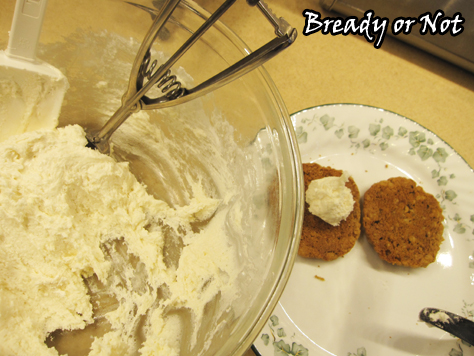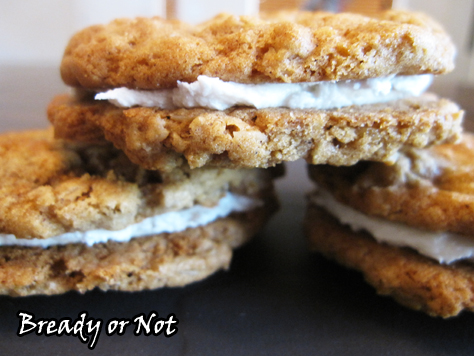Sunday Quote cranks up the AC
Read More“Where is human nature so weak as in the bookstore?”
~ Henry Ward Beecher
Bready or Not: Oatmeal Cream Pies
Today I present something seriously delicious: Oatmeal Cream Pies, aka Sandwich Cookies.
These things are about the size of a sandwich, too, and about as filling because of the chewy oatmeal cookies. You have two tablespoons worth of dough with a teaspoon of marshmallow cream between them. So yeah.
I don’t think I’d make smaller cookies, though, for sheer reasons of space and time. The recipe makes over four dozen cookies, which makes for over two dozen sandwich cookies. This is a recipe to make for a lot of hungry adults or kids!
If you love commercial-made cream pies like the ones from Little Debbie, these homemade ones will blow your mind. They have that same taste and texture, but with some extra chewy freshness.
I highly advise that you use tablespoon and teaspoon scoops for this recipe, too. It helps a lot if the cookies are of uniform size and that the amount of filling is equally distributed.
Modified from Taste of Home.
Bready or Not: Oatmeal Cream Pies
Ingredients
Cookies:
- 1 1/2 cups shortening
- 2 2/3 cups brown sugar packed
- 4 large eggs
- 2 teaspoons vanilla extract
- 2 1/4 cups all-purpose flour
- 2 teaspoons ground cinnamon
- 1 1/2 teaspoons baking soda
- 1 teaspoon salt
- 1/2 teaspoon ground nutmeg
- 4 cups old-fashioned rolled oats
Filling:
- 3/4 cup shortening
- 3 cups confectioners' sugar sifted
- 7 oz marshmallow creme 1 jar
- 1 - 3 Tablespoons milk or half & half
Instructions
- Preheat the oven at 350-degrees. In a large bowl, cream together the shortening and brown sugar until they are light and fluffy. Beat in eggs, one at a time, followed by the vanilla extract.
- In another bowl, combine the flour, cinnamon, baking soda, salt and nutmeg; gradually add this dry mix to the creamed mix. Stir in oats. If you're using a stand mixer, you'll probably need to stir the last of the oats in by hand. This is a lot of dough!
- Use a tablespoon scoop to dole out the dough onto a cookie sheet, keeping two inches between each spoonful. These will spread.
- Bake for 10 to 12 minutes; they brown very fast, so keep an eye on them at the end. Remove them when they are turning golden brown. Let sit on cookie sheet for 10 minutes before transitioning them to a rack to cool.
- To make the filling, start by sifting the confectioners' sugar into a large bowl. Add the shortening and marshmallow crème. Add a tablespoon of milk and gradually add more as needed to get it to spreadable consistency. Use a heaping teaspoon to dollop filling onto the base of a cookie. Spread it with a knife, top with another cookie, and press together to get cream to the edges.
- End result: about 30 large sandwich cookies.
- OM NOM NOM!
Clockwork Crown Giveaway & Breath of Earth Series Sweepstakes
Free books! Who wants free books?! My publisher is hosting a sweepstakes to win both Breath of Earth and a galley of Call of Fire. All it takes is your email address to enter! Do that right over here.
Also, my giveaway for The Clockwork Crown on Goodreads ends TOMORROW (Wednesday). [US only] Enter that through the spiffy widget below!
Goodreads Book Giveaway
#SFWAPro
Read MoreSunday Quote ponders cheese
Read More“Rock bottom became the solid foundation on which I rebuilt my life.”
~ J.K. Rowling
Shut Up! Times When It’s Imperative You DO NOT Share Happy Writing News
Writing is hard. Revising is hard. The submission cycle is downright depressing. Querying agents? It sucks away your soul, email by email.
That means that it’s especially hard to contain yourself when good news comes at last. It’s tempting to scream to the world–in reality and in all caps–that the story finally sold! That an agent wants your full manuscript! That a publisher wants your book!
DON’T. Take your hands off the keyboard. Step away from your phone. Maybe tell a few select people, but don’t you dare announce your good news in the early stages. Speaking out too soon shows that you’re unprofessional and unable to keep a secret. You may very well sabotage the deal you’re so happy about. Google is the biggest tattle-tale in the world, you know. Editors and agents will follow your social media and blog, and not in a creepy way, either. If they are taking the time to look you up, that’s a great thing. They want to know you! You’re establishing an important business relationship.
You want that relationship, too. So here are the moments when you need to sit on your hands.
– A story acceptance
It’s awesome to get that initial acceptance email, but the deal isn’t real until there is a double-signed contract. That makes it legally binding. Even then, sometimes a publisher will ask you to refrain from public mention for a while; for example, this might happen if they are still sending out rejections for that particular issue. Respect that request.
– The contract is signed but the work hasn’t been published after months of wait OR you didn’t get paid when it was published OR your story was revised without your permission, etc.
Sometimes, even after a contract is signed, a deal might fall apart. Maybe the editor pulls a jerk move, or editors change and the new one doesn’t want your work, or the publication dies, or your reminders about payment get no reply. This puts you in a delicate position because you have a valid right to complain. Don’t do that in public as step one, though. You want to build your case. Query the editor, if you can. Query more than once over a period of time. Go onto password-protected writer forums and find out if there are other writers in the same position as you. You want allies! Maybe together, you can make yourselves heard, either through email or as a united front on social media. If you’re a member of SFWA, Griefcom is a valuable resource with professionals who will intercede on your behalf.
– An agent has rejected your manuscript OR requests a partial or full manuscript OR wants to call you
Querying agents is a long, difficult, demoralizing process, but it’s not one to be discussed in public. Why? Agents NEED to check you out online. You don’t want them to know they’re the 73rd agent you’ve queried, or that you’ve been querying this book for three years. More than likely, you’re querying a bunch of agents at the same time (as one should, unless you offered an exclusive; it would take forever to query one by one). You want all of those agents to think they are your top choice. You want to appear professional yet also personable. Throughout various stages of the publishing process, you need to be able to keep a secret. If you’re a blabbermouth, well, will they want to work with you?
You DO need a safe place to vent or celebrate through the querying process, though. Find a password-protected private place to do that. I used Agent Query back in the day, but there are various other writer forums or private Facebook groups where you can safely chronicle your journey.
– An agent offers representation
Again, this is a test of how you can keep a secret, but it’s also a show of respect for other agents who may be considering your work. You likely have queries out with multiple agencies. When you get an offer, don’t say ‘yes’ right away, no matter how tempting; ask for a period of time like a week or two so that you can send notice to other agents to give them a chance to respond. You suddenly look a lot more appealing once you have an offer on the table. Other agents will likely want to push your query/manuscript to the top of their pile so they can find out what the fuss is all about. You might get more requests for the full manuscript or other offers of rep.
Again, share this joy in a private setting online. Don’t liveblog it, or you’ll look tactless and rude to other agents. Again: until the contract is signed with an agent, it’s not a done deal. Don’t sabotage yourself.
– An editor makes an offer for your book
This is the most aggravating secret in the world, but you dare not say a thing until the proper time. And that proper time may be a long time coming. Contract negotiations may take months with a major publisher–maybe even six months or more. If you speak out before the deal is done, you will look very, very bad.
There’s an extra level of aggravation here, too. Even after the paperwork is signed, you still need to keep every mum for a little while longer. Most large-publisher book deals aren’t official-official until they are in Publishers’ Marketplace. Most writers don’t subscribe to that because it’s expensive, but a friend may scream the news to you online (that’s how I knew I could announce my first deal at long last–a friend told me on Twitter!) or your agent can give you the head’s up.
At that point, mash down the capslock and scream the news to the world. YOU HAVE A BOOK DEAL!!!!!!!!
Reposted from Novelocity.














